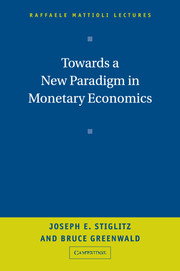
-
Select format
-
- Publisher:
- Cambridge University Press
- Publication date:
- May 2010
- September 2003
- ISBN:
- 9780511615207
- 9780521810340
- 9780521008051
- Dimensions:
- (216 x 138 mm)
- Weight & Pages:
- 0.59kg, 344 Pages
- Dimensions:
- (216 x 138 mm)
- Weight & Pages:
- 0.488kg, 344 Pages
- Subjects:
- Economics, Economic Theory
- Series:
- Raffaele Mattioli Lectures
You may already have access via personal or institutional login- Subjects:
- Economics, Economic Theory
- Series:
- Raffaele Mattioli Lectures
Book description
Towards a New Paradigm for Monetary Economics presents a pioneer treatment of critical topics in monetary economics. Unlike the prevailing monetary theory, this book focuses not on the role of money in facilitating transactions, but on the role of credit in facilitating economic activities more broadly. The 'new paradigm' emphasizes the demand and supply of loanable funds, which in turn requires the understanding of the imperfections of information and the role of banks. One enlightening view is that credit is quite different from other commodities in the sense that the former is based on information and default risk. The book consists of two parts. The first part develops a basic model of credit based on banks' portfolio choices. The second part is dedicated to the policy implications, among which are the liberalization of financial markets, the East Asian Crisis, the 1991 US recession and the subsequent recovery.
Awards
Professor Joseph E. Stiglitz is the winner of the 2001 Nobel Prize for Economics
Reviews
‘… recommended reading for all monetary economists and practitioners alike.’
Source: International Affairs
‘Overall this is an excellent contribution to our understanding of the functioning of modern financial markets. It will become essential reading for students, researchers, practitioners and policy-makers with an interest in the behaviour of monetary and financial systems.‘
Source: Journal of International Development
Contents
Metrics
Altmetric attention score
Full text views
Full text views help Loading metrics...
Loading metrics...
* Views captured on Cambridge Core between #date#. This data will be updated every 24 hours.
Usage data cannot currently be displayed.
Accessibility standard: Unknown
Why this information is here
This section outlines the accessibility features of this content - including support for screen readers, full keyboard navigation and high-contrast display options. This may not be relevant for you.
Accessibility Information
Accessibility compliance for the PDF of this book is currently unknown and may be updated in the future.


